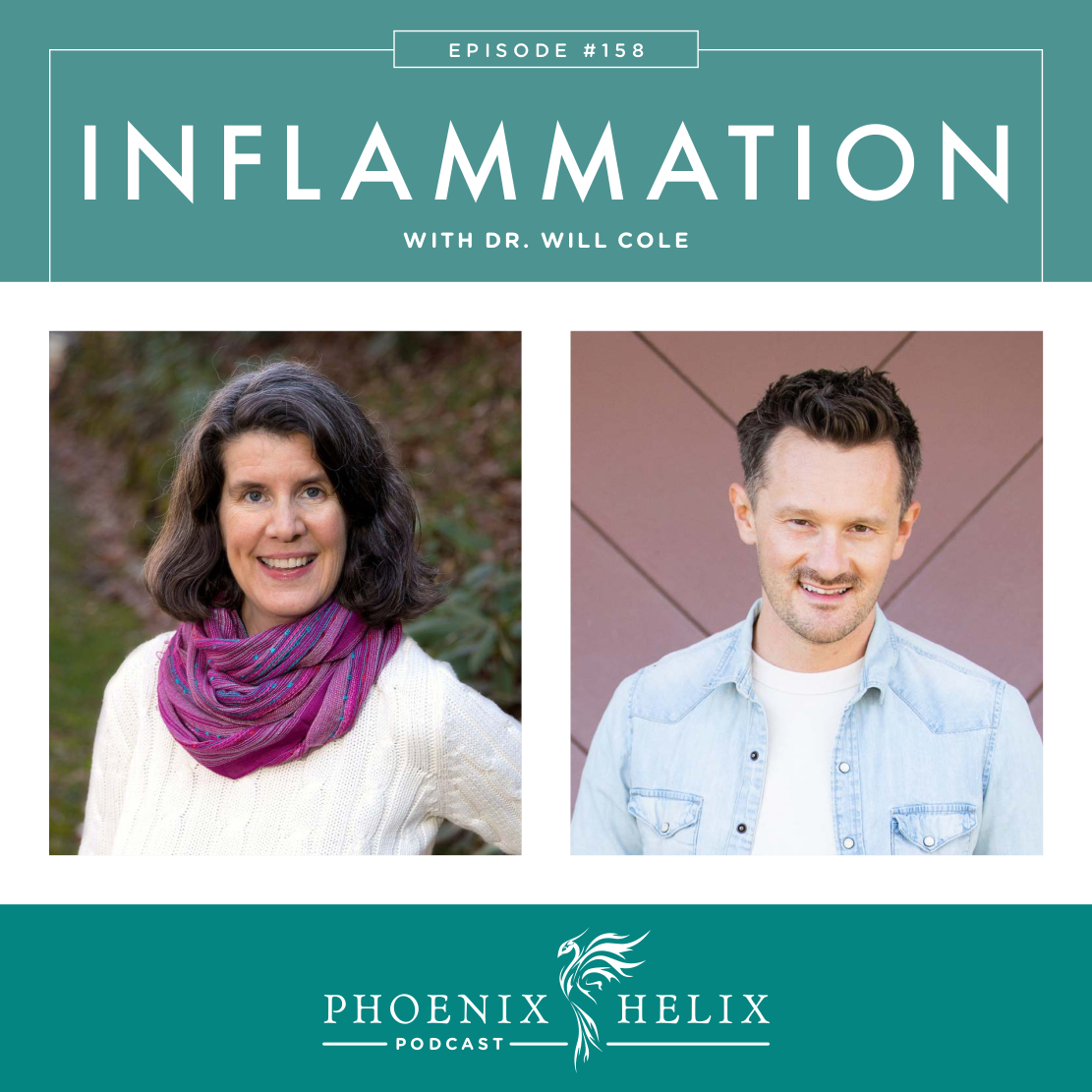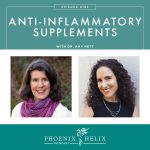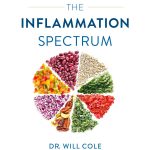Inflammation and Autoimmune Disease
Inflammation is a natural part of being human – in fact, it can save our lives, but when it gets out of control, it can also cause damage. People with autoimmune disease know that very well. Every time we have an autoimmune flare, inflammation is part of that process. The higher the inflammation, the worse the flare. Not only that, but chronic inflammation is both a symptom of autoimmune disease and a root cause. How do we interrupt that cycle? How do we manage acute inflammation in the moment, and reduce chronic inflammation long-term? My guest today is Dr. Will Cole, a leading functional medicine expert and author of the book, The Inflammation Spectrum. He specializes in identifying and treating the root causes of chronic illness. Autoimmune disease is one of his specialties.
Listen to the Show
- Subscribe to my podcast through your favorite podcast app: iTunes, Stitcher, Google, TuneIn, Spotify, Amazon, etc.
- You can also listen to the episode right here through the player below, and if you subscribe to my newsletter you’ll get notified of future episodes.
Podcast: Play in new window | Download
Show Notes
- Intro (0:00)
- Thank You To Our Podcast Sponsor – Luminance Skincare (2:07)
- It’s officially Fall in the northern hemisphere, and that means it’s pumpkin season! To celebrate, Luminance created a Pumpkin Enzyme Exfoliating Facial Mask. The enzymes gently exfoliate the skin while providing nourishing antioxidants. The mask also includes warm notes of vanilla and lemon through pure essential oils. They’re also celebrating Autumn in two other ways. From 10/5-10/8, every order of $50 or more will receive a free gift of their Orange Spice Body Lotion. And if you miss that offer, look for their Halloween sale at the end of the month.
- Whereas conventional skincare products are full of chemicals that can hurt our bodies, Luminance is made from ingredients that nourish. Their products are natural, organic, wildcrafted, non-GMO, and gluten-free (and they’re even made in a dedicated gluten-free facility).
- They have a complete face and body care line, including cleansers, toners, moisturizers, masks, acne serum, sunscreen, haircare, and more.
- Place an order here, and use the code HELIX for 10% off your first order.
- Meet Will (3:48)
- Dr. Will Cole is a Doctor of Natural Medicine (DNM) and Doctor of Chiropractic (DC). He’s also received post-doctoral training in Functional Medicine and Clinical Nutrition.
- He grew up in a health-conscious family and rather than rebelling, it planted a seed about the importance of diet and lifestyle choices in health. He decided to make it his career. With his formal training, he fell in love with research and science as well as clinical work with patients.
- Dr. Cole has autoimmunity on both sides of his family as well as a double-mutation of the MTHFR gene which increases his risk, so this is a personal mission as well. He walks his talk, using diet, lifestyle, and functional medicine to maintain his health.
- What Is Inflammation? (10:26)
- It’s an essential part of our biochemistry and a natural product of our immune system. Inflammation fights viruses and bacteria, heals wounds, and is necessary to life.
- However, it’s subject to the Goldilocks Principle: you don’t want inflammatory levels in the body to be too high or too low, but rather just right. When in balance, inflammation is an asset. When it goes out of balance and becomes chronic, it’s like a fire running through your body that can cause a lot of damage.
- Chronic inflammation underlies almost every chronic disease, including autoimmune disease.
- The Many Ways Inflammation Impacts the Body (11:38)
- Inflammation can create problems in 7 different areas: brain, digestion, detoxification, blood sugar, hormones, musculoskeletal, and autoimmune. Poly-inflammation is when it shows up in multiple areas of the body.
- You can take Will’s Inflammation Spectrum Quiz either online or within his book. It will help you see where inflammation is presenting in your own body.
- Many people don’t realize mental illness often has an inflammatory component. In fact, Will considers mental health the “check engine light” for the body, because inflammation often shows up there first. (Resource: Podcast Ep. 140 – Autoimmunity and the Brain.)
- Other common symptoms that people may not realize have an inflammatory component are brain fog and fatigue.
- Acute vs. Chronic Inflammation (18:42)
- Acute inflammation is a vital part of the body’s healing process – whether it’s fighting a virus or infection, or healing an injury. It can sometimes feel painful, but it’s also beneficial. A balanced inflammatory response activates when needed and stays calm otherwise. When your body has healed, the inflammation recedes.
- Chronic inflammation is when the body is in a constant inflammatory state. It’s a harmful process instead of a beneficial one, and it’s a root cause for almost every disease. Because this response is low-grade and diffuse, many people aren’t aware it’s happening until enough damage has been done to be diagnosed with a disease. The Inflammation Spectrum Quiz helps identify chronic inflammation.
- Inflammation & Autoimmune Disease (20:38)
- Inflammation doesn’t always lead to autoimmune disease. It can trigger other health problems instead, such as heart conditions, mental illness, metabolic issues, etc. However, if you have autoimmune disease, inflammation is part of that process.
- By the time someone is diagnosed with autoimmune disease, they’ve often been experiencing inflammation for years. There are three stages of autoimmunity: (1) Silent Autoimmunity – Your labs might show antibodies but there are no symptoms. (2) Reactive Autoimmunity – You’re experiencing symptoms but don’t fit the diagnostic criteria for autoimmune disease. Many people with fibromyalgia fall into this category. (3) Autoimmune Disease – Your symptoms are severe and clear enough to meet the diagnostic criteria for a specific autoimmune disease.
- There’s also a vicious cycle with inflammation and autoimmune disease – the higher the inflammation, the higher the flare activity. and then autoimmune activity simultaneously increases inflammation.
- Autoimmune disease is believed to be 1/3 the product of our genes and 2/3 epigenetics – the stressful forces that can activate genes (food reactions, toxins, trauma, stress, infections, etc.)
- The good news is that with diet, lifestyle, and functional medicine, you don’t need to wait for a diagnosis to intervene and reduce the inflammation and improve your quality of life.
- Gut Health, Inflammation & Autoimmune Disease (25:51)
- 70-80% of our immune system resides in our gut. It’s also considered the “second brain” and 90% of the body’s seratonin is produced and stored in the gut.
- Gut issues (leaky gut, dysbiosis, SIBO, infections) are a common trigger of chronic inflammation. Particles can leak into the bloodstream that shouldn’t be there (such as undigested food particles or bacterial toxins). The body will tag those with antibodies for removal. If the body blurs the line between those particles and parts of the body, that’s called molecular mimicry and it triggers an autoimmune attack.
- Molecular mimicry is the difference between autoimmune inflammation and other chronic inflammation. However, Dr. Cole believes that science will eventually show that all chronic disease has an autoimmune component.
- Note: While gut health is one common trigger of autoimmunity, it’s not the only one. Functional medicine looks at each person individually to identify root causes and triggers. Will’s book uses this same approach.
- Thank You to Our Podcast Sponsor: Paleo on the Go (33:48)
- A frozen meal delivery service, 100% of their menu is compliant with the elimination phase of the paleo autoimmune protocol (AIP). They have over 5o items, including entrees, side dishes, broth, AIP-friendly bacon, and desserts.
- Use the code PHOENIX for 10% off your first order.
- Inflammatory Habits (35:25)
- It’s not just food intolerance or toxins that increase inflammation. Our lifestyle choices play a big role, too.
- Examples of inflammatory habits: unmanaged stress, a sedentary lifestyle, toxic relationships, not enough sleep, addiction to technology, etc.
- Part of the challenge of lifestyle change is that you can’t go cold-turkey. You can’t give up stress the way you give up gluten. And healthy habits in this area take time to build. That’s why Dr. Cole likes to start people off with baby steps, and his book is full of those.
- Sample baby steps:
- Note: you don’t have to do all of these. Don’t get stressed out about stress relief. Choose one or a few practices that resonate with you. Try them out, discard the ones you don’t like, and continue with your favorites.
- Start to incorporate acts of stillness into your day. They don’t have to be long – they are small moments of calm that you create for yourself. Examples are meditation (there are many different types), gentle movement like yoga or tai chi, spending time in nature, deep breathing, tea rituals, etc.
- With larger stressful situations, there are 3 healthy responses: change what you can, leave what you can, and accept what remains.
- With technology, consider setting some boundaries around your use. Technology has benefits like connection and community. But it also generates anxiety, FOMO, and political posts can be triggering. Choose how you use it, and try to avoid it first thing in the morning and last thing before bed.
- For more ideas, listen to Podcast Ep. 148 – Self-Soothing vs. Self-Care.
- Bio-Individuality (45:56)
- When it comes to healing, we’re all unique. The inflammatory cascade may be similar, but we each have different triggers, symptoms, and needs in terms of food, supplements, and lifestyle practices that successfully lower the inflammation. A key part of healing and functional medicine is this journey of discovering what does and doesn’t work for you. Self-experimentation is part of the process.
- Anti-inflammatory Foods (47:03)
- Foods are common triggers of inflammation, and elimination diets like the paleo autoimmune protocol are incredibly helpful in identifying your personal food triggers. Dr. Cole’s book contains two elimination diet plans for this reason.
- But the foods we add to our diets are just as important as the foods we remove. This can be bio-individual as well, and the book recommends different foods based on where the inflammation is appearing in your body. However, Will does have some favorite anti-inflammatory foods he finds beneficial for most people: (1) Extra-virgin olive oil. – there’s a lot of research into its anti-inflammatory effects. (2) Seafood – an easily digested protein that contains anti-inflammatory omega 3 fatty acids and fat soluble vitamins.
- It’s also important to remember that elimination diets like the AIP are meant to be short-term, and the food reintroduction process is very important. It’s where we personalize and expand our diets. (Resource: AIP Reintroduction Series).
- Anti-inflammatory Supplements (54:00)
- Supplement needs are bio-individual as well, but as a general recommendation Dr. Cole sees many patients who are deficient in the fat-soluble vitamins like vitamin A, K2, and D3. Those are essential to healthy immune function and the regulation of inflammation. Methylated B vitamins can be beneficial as well.
- Tests to Track Inflammation (55:57)
- A symptom diary is incredibly helpful. The Inflammation Spectrum Quiz can also be used to track progress, but lab tests alongside those are very helpful.
- Dr. Cole recommends three inflammation tests:
- HS-CRP – When inflammation is balanced, it’s < 1.
- Homocysteine – When inflammation is balanced, it’s < 7.
- Ferritin – If it’s high when other iron levels are normal, it’s a sign of inflammation.
- In his functional medicine practice, he may also do more detailed testing individualized to each patient.
- Outro (58:37)
- You can connect with Dr. Will Cole through his website. He consults with people worldwide, offering 1:1 telehealth sessions as well as group classes. He’s also the author of two books: The Inflammation Spectrum and Ketotarian.
- Eileen (your podcast host) is the author of multiple books, written to help people thrive with autoimmune disease. Learn more on the Books Page.
- If you like this podcast, follow or subscribe through your favorite podcast app. You can also subscribe to Eileen’s biweekly newsletter.
- Check out the entire archive of podcast episodes.
You May Also Be Interested In
Spreading the Word
If you like the podcast, please leave a positive review in iTunes. It would mean the world to me, and also helps others find the podcast. Here are some quick instructions using your iPhone:
- If you are already subscribed to my podcast: (1) Click the purple podcast icon. (2) At the bottom of the screen, click Library. (3) At the top of the screen, click Shows. (4) Click the Phoenix Helix podcast image. (5) Scroll down the page, and you’ll see Ratings and Reviews. Scroll down a little bit more and click on Write a Review. This will bring up the review screen. Tap 5 stars (if you love the podcast), and then click in the title box, and it will bring up the keyboard. Enter a title and short review. (6) Click Send in the upper right corner. (7) Thank you! Positive reviews give the podcast a higher search ranking in iTunes, helping people find it and letting them know it’s a quality podcast and worth their time to listen.
- If you haven’t subscribed to my podcast: (1) Click the purple podcast icon. (2) In the lower right corner, click the magnifying class. (3) Type Phoenix Helix in the search box. (4) Click the podcast cover in the Show list. (5) If you’d like to subscribe, click the + sign at the top of the screen. (6) To write a review, scroll down the page, and you’ll see Ratings and Reviews. Scroll down a little bit more and click on Write a Review. This will bring up the review screen. Tap 5 stars (if you love the podcast), and then click in the title box, and it will bring up the keyboard. Enter a title and short review. (7) Click Send in the upper right corner. (8) Thank you! Positive reviews give the podcast a higher search ranking in iTunes, helping people find it and letting them know it’s a quality podcast and worth their time to listen.








